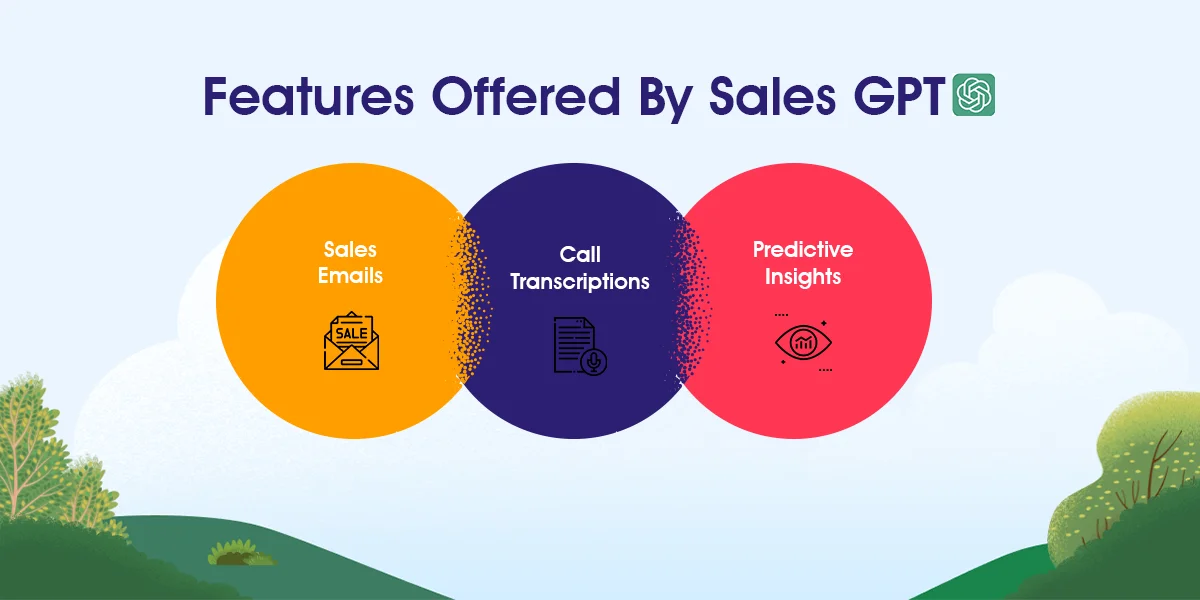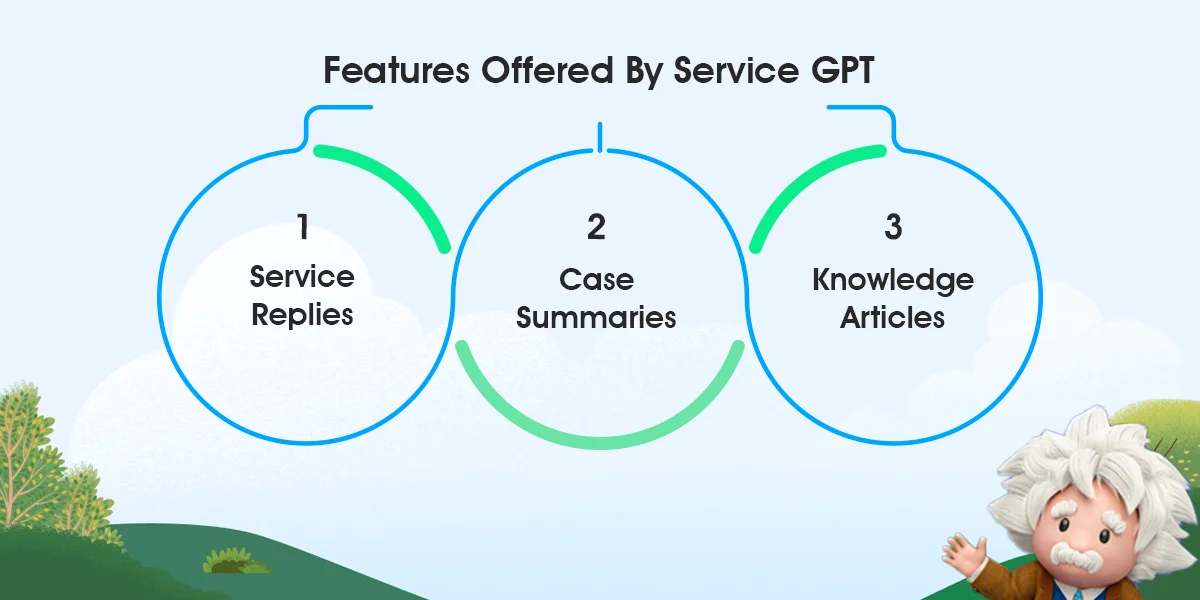How Generative AI Can Become a Game-Changer for Salesforce?
Table of Contents
Artificial Intelligence has never ceased to captivate our imaginations from its inception to today. Its relentless evolution from simple AI to Generative AI today keeps it vibrant as a buzzword.
Amidst a sea of AI tools and platforms flooding the market, only a handful have secured attention and widespread adoption. The likes of Dall-E, OpenAI, Google Assistant, Otter.ai, and the intriguing Generative AI are all striving to etch their impact on a global scale.
With increasing AI demand, Salesforce, the world’s foremost Customer Relationship Management platform, has introduced its own Generative AI for CRM, Salesforce Einstein GPT. This Salesforce Generative AI got its very own cloud soon after with the name of Salesforce AI Cloud, which is like a moniker swiftly gaining recognition, propelling it to the forefront of the CRM market.
But here’s the question that echoes: Is Generative AI the New Future of Salesforce?
To explore the answer to this question, Shrey Sharma (aka Salesforce Hulk) took charge with Vishwajeet Srivastava (CTO at Cyntexa and a passionate tech explorer) in a recent webinar on Generative AI becoming the new future of Salesforce. Together, they peel back the layers of Generative AI in Salesforce delving deep into its essence and its potential to become the catalyst for Salesforce’s next quantum leap.
Curious about what they uncovered in their conversation? If you missed the enlightening webinar, fear not.
Explore here.
Understanding Traditional AI vs Generative AI
Traditional AI relies on predefined rules and logic for computers to perform tasks and lacks learning from data or adaptation. It requires minimal training, unlike data-intensive machine learning.
Generative AI is a subset of AI that creates new content through algorithms and models. It trains on existing data and generates new examples.
Then, are there any grounds on which we can define them:


The next question in the row is: How does Generative AI work?
“Generative AI is not something which is just new. It’s been there since the 1960s; the fact is it got a boom in late 2014 through GANs (Generative Adversarial Networks). Basically, Generative AI learns from patterns and relationships between the data and creates new content from it”, says Vishwajeet on how generative AI works.
How does Generative AI work?
Well, to put Generative AI in action, there are several models available in the market. Some of them are:
1. Generative Adversarial Networks (GANs)
GANs are popular for being a class of models. It contains two neural networks:
- Generator: the one who creates content based on the prompt received, and
- Discriminator: the one who evaluates the authenticity of the content generated.
They both function parallel to deliver the improved content simultaneously maintaining the quality. Let’s understand it with an example:
Think of GANs like a creative game. One player makes imaginary stuff, like pictures, and the other player tries to spot what’s real and what’s not. As they play more, the imaginary become so good that it’s hard to tell them apart from real things.
GANs work the same way: one part makes fictitious, and the other part tries to tell if they’re real or not. They learn from each other, and eventually, the unreal becomes super realistic.
2. Transformer Based Models
A Transformer-based model is a type of smart computer program that’s great at understanding and creating text. It’s like a chat partner that learns by reading lots of books and then writes stories that make sense.
For instance, if you ask about animals, it can tell you about lions, tigers, and even imaginary creatures like unicorns! Or if you ask what code is correct, it will generate and check the authenticity of the code, allowing you to work smarter and faster.
While these are the top two Generative AI models, it’s important to acknowledge the value of others too. We recommend you watch our recent webinar where Shrey highlighted additional models such as the Diffusion model, Variational Autoencoders, LLMs (Large Language Models), and more.
What does Generative AI bring to the business?
Generative AI is changing how businesses connect with customers and work smarter. It makes emails and chats feel like real conversations, keeping customers engaged. It also helps businesses know what people like, so they can make things that people want and make more money.
Generative AI is like a super detective, spotting problems before they become big. This way, businesses can fix things early and keep everything running smoothly.
Another Catch. It’s also like a helper for creative teams. It makes amazing stuff like social media posts, emails, and videos. This helps businesses look good to their customers. By creating authentic content, bridging gaps, and diversifying samples, it enriches datasets. This, in turn, enhances machine learning model training and derives valuable insights from limited information.
Customer support receives a remarkable boost with Generative AI. Rather than enduring long queues and vague responses, customers experience personalized interactions. The speed and quality of these responses helps customer support executive outshine in their jobs.
Shifting from traditional methods, implementing automatic task and resource allocation frees up human resources for strategic roles, while Generative AI handles the allocation process.
So, Generative AI is like a smart sidekick for businesses, making things better and easier.
Evolution of AI in Salesforce
“It’s not like Salesforce has just jumped to AI and created some GPTs because it’s very high in buzz,” mentioned Shrey.
Salesforce started AI research in 2014, followed by the acquisition of RelatedIQ, PredictionIQ, and Metamind in 2015 & 2016, respectively.
With constant innovation and surging demand for artificial intelligence, Salesforce finally rolled out its Salesforce Sales GPT and Service GPT in July 2023, announcing more are coming in the row.
In between, they introduced several AI-based functionalities empowering different products and allowing businesses to benefit from the intelligences-based recommendations and outputs. Take a look at how AI in Salesforce evolved:

Salesforce AI Cloud and all Salesforce GPT Innovations
On June 12, 2023, Salesforce unveiled its advanced AI Cloud, a milestone in cloud tech evolution. Tailored for CRM, it elevates customer experiences and enterprise productivity.
This innovation integrates AI, data, analytics, and automation, delivering reliable, real-time, generative AI in an enterprise-ready format.
Before that, Salesforce announced its stepping into stronger artificial intelligence by launching Salesforce Einstein GPT on March 7, 2023, in TrailBlazerDX.
What is Salesforce Einstein GPT?
Einstein GPT is the newest and first member of the Salesforce GPT family. Einstein GPT crafts personalized content across Salesforce clouds through generative AI, enhancing productivity and elevating customer experiences.
Its openness and extensibility support public and private AI models designed for CRM, all trained on reliable, up-to-date data.
Explore Salesforce GPT Innovations
Salesforce witnessed a high-steep success through Einstein GPT, which made it bring more cloud-based GPT into the market, allowing cloud users to benefit from the abilities of generative AI.
Here is the list of all Salesforce Einstein GPTs empowering Customer 360:
Salesforce Sales GPT
Sales GPT provides dependable AI to fuel organizational expansion. By consolidating generative AI and data on a unified platform, sales teams revolutionize their approach, selling smarter, quicker, and more efficiently.
Features of Sales GPT


- Sales Emails – Imagine you work at a software company. You have a list of potential clients in your CRM. You can use AI to create personalized emails for each potential client, introducing your software’s benefits. If some of them don’t reply, AI can also help you send follow-up emails automatically, reminding them of your software’s features
- Call Transcriptions – Let’s say you manage a sales team at a call center. After a call, instead of manually taking notes, AI can transcribe the call conversation into text. It can even analyze the conversation to identify key points and actions needed. This saves time and helps your team quickly understand what needs to be done next based on the call.
- Predictive Insights – In a retail business, you’re planning for the upcoming holiday season. AI can analyze past sales data, market trends, and other relevant factors. It can then provide you with accurate predictions on which products are likely to sell the most during the holidays, along with explanations based on the data it analyzed.
Salesforce Service GPT
Service GPT is a potent tool that employs advanced AI and up-to-the-minute information from the Data Cloud to enhance service experiences. It aids service teams in automating repetitive tasks and prioritizing the development of strong customer connections.
Features of Service GPT


- Service Replies – In a travel agency, when a customer inquires about flight availability to a specific destination, the system generates an instant response using current flight data, booking history, and relevant preferences from the CRM.
- Case Summaries – At a tech support company, after resolving a customer’s computer issue, the system automatically compiles a summary detailing the problem, solution steps, and recommendations for future maintenance.
- Knowledge Articles – In a software company, as support agents help users troubleshoot software glitches, the system creates and updates articles with step-by-step instructions based on the most common issues encountered.
Salesforce Commerce GPT
Commerce GPT enhances businesses’ efficiency by automating personalization across the customer journey, resulting in smarter sales and time-saving. It crafts personalized product recommendations based on customer data and provides GPT-guided e-commerce strategies to fulfill business goals.
Features of Commerce GPT


- Commerce Concierge – Let’s say you’re browsing for new clothes, the Commerce Concierge feature acts like a helpful assistant in an online ecommerce store who engages in personalized conversations with you. It can suggest outfits based on your style preferences, recommend matching accessories, and even provide real-time fashion advice, making your shopping experience more interactive and enjoyable.
- Einstein Product Recommendations – Einstein Product Recommendations analyzes your history, purchases, and preferences to suggest fitting products. For example, if you bought gaming accessories, it can recommend a gaming laptop, enhancing your shopping and discovery. These tailored suggestions enhance your shopping experience and encourage you to discover products you might not have considered otherwise.
- Einstein Commerce Insights – Suppose you’re shopping for home appliances in an online store. After adding items to your cart, the Einstein Commerce Insights feature comes into play. It analyzes your cart content, your behavior on the website, and purchase trends. It then provides valuable insights to the store owner about what products are driving higher conversions, helping them make informed decisions to optimize their offerings and increase sales.
Salesforce Marketing GPT
Marketing GPT is a powerful tool that lets marketing teams use generative AI and first-party data from Data Cloud to create personalized content and campaigns at scale. It helps businesses connect with customers meaningfully across every channel, using AI seamlessly integrated with Marketing Cloud.
Features of Marketing GPT


Segmentation: Think of segmentation as sorting your audience into different groups based on certain characteristics. For instance, if you run an online store, you could use segmentation to target customers who like sports products differently from those who prefer fashion items.
- Journey Optimization – Journey optimization in Salesforce Marketing GPT means finding the best way to guide your customers through their shopping experience. With AI, the platform can figure out the most effective steps to engage customers – like showing them specific products or sending personalized messages to enhance their shopping journey.
- AI-based Data Integration – Salesforce Marketing GPT uses AI connectors to translate different types of data from various sources and bring them together seamlessly. For example, if you have customer information stored in different software, the AI connectors can help integrate this data so you can get a complete view of your customer’s preferences and behaviors without any manual work.
Salesforce Slack GPT
Slack GPT is a smart tool that enhances automation, knowledge sharing, and conversations in Slack. It allows companies to customize the AI to suit their needs by integrating with other apps or building solutions.
Features of Slack GPT


- Summarize Conversations – Slack GPT can help you catch up on important messages by providing instant summaries of conversations, making it easier to stay updated on discussions and decisions.
- Automate Tasks – With No-Code Workflows in Slack GPT, you can set up these virtual assistants to connect different tools you use. For example, you could create a workflow that automatically sends a message to your team’s Slack channel whenever a new task is added to your project management software.
- Create Custom Integrations – With Slack GPT, you can develop special connections between various software and systems. Consider a case when you want to use advanced AI intelligence from large language models (LLMs) to analyze customer feedback from different sources. You can create a personalized integration that gathers data from these sources, feeds it to the LLM, and provides you with insightful information.
Salesforce Tableau GPT
Tableau GPT acts as your assistant, using advanced generative AI to make data analysis easier and accessible to more people. You can discover insights by simply asking questions, enabling smarter data experiences.
Features of Tableau GPT


- Automated Analytics – Tableau GPT serves as a campaign dashboard. Imagine you’re a marketing manager overseeing multiple client campaigns. This tool functions like a digital hub that presents real-time metrics such as website traffic, click-through rates, and conversion data on the homepage. This quick overview empowers you to make data-driven decisions, optimize strategies, and allocate resources efficiently without the need to toggle between various platforms.
- Personalized Metrics – Think of Tableau GPT as a personalized financial dashboard for a bank manager. You can choose to track metrics like customer deposits, loan approvals, and credit card applications. Each card on the dashboard shows the latest numbers, trends, and AI-generated insights. It’s like having a financial analyst at your fingertips, helping you monitor crucial aspects of the business.
- Secure and Compliant – Consider your business as a bank that handles sensitive financial information. Just like the bank ensures that customer data is kept safe and confidential, Tableau GPT ensures your business data is secure. It’s like having a vault that follows all the necessary rules and regulations to protect your information. This not only helps keep your business’s data safe but also ensures that you’re meeting legal requirements and industry standards.
Demo of Generative AI In Salesforce
Let’s understand with this demo how Generative AI in Salesforce works when operating in an actual business scenario.
How Salesforce is addressing the security concerns of businesses around the usage of Generative AI?
“Is AI going to be a security threat to our business?”
“Is the data stored or fed to AI be used against our business, causing us any potential threat?”
These are some questions that businesses are often asking when it comes to relying on Generative AI. To end doubts like this, in its AI Cloud and Einstein GPT, Salesforce created a protective layer of security.
Powered with the competency of OpenAI, Salesforce designed an Einstein GPT Trust Layer, empowering businesses to secure their data and depend freely on generative AI for CRM.
Einstein GPT Trust Layer
Salesforce Einstein GPT Trust Layer encompasses a suite of trust and safeguarding features thoughtfully curated by Salesforce for its generative AI capabilities, including all GPT under AI Cloud
These dynamic features leverage extensive language models (LLMs) to craft individualized, data-driven responses for customer engagements. Nevertheless, the significance of generative AI presents certain complexities and potential hazards, ranging from data security and contextual precision to toxicity detection and data confidentiality.
The Einstein GPT Trust Layer takes over the role of securing data diligently averting any undesired behavior that generative AI may inadvertently exhibit.
By adding the trust layer to the platform, you can build features with LLM models, making Salesforce minimize the “trust gap”. It often holds leaders back from adopting Generative AI.
Check out how this trust layer works in the Salesforce Generative AI model in the words of Shrey:

How does the Einstein GPT Trust Layer work?
- Through the active utilization of OpenAI capabilities, Salesforce CRM initiates a prompt within the Data Cloud (that houses your organization’s information). This prompts a secure data retrieval process
- Then, it moves for Dynamic grounding which is like filtering the relevant data from the database and identifying essential information necessary for AI-driven actions. This information is then stored for reference.
- Moving forward, Data Masking comes into play to safeguard personally identifiable information (PII) contained in the prompts received from AI.
For instance, when crafting a personalized email for a lead, the Data Masking Trust Layer selectively focuses on the subject matter, crafting content without retaining any personal details about the lead. This meticulous approach masks identifiable information without retaining any data within AI systems, adhering to a zero-retention policy and ensuring robust data security. - Upon content generation and sharing the output undergoes Toxicity Detection which assesses screens for inappropriate or irrelevant content within the generated output.
It helps eliminate the risk of generation of any absurd content by AI. - The process ends with an Audit Trail, meticulously maintaining logs for all AI transactions. This feature empowers users to discern AI-generated content from human-curated content, fostering transparency and accountability in data origination and curation.
Learn more about the capabilities and pricing of Salesforce Einstein GPT Trust Layer.

Busting Myths: Is Generative AI an ideal choice for you?
Looking forward to its constantly evolving capacity, many leaders across the globe are coming across whether or not Generative AI will be any good for them or not?
Shrey quoted the following myths and busted them one by one along with Vishwajeet:

Myth 1: Generative AI Produces Uncontrollable Output
Reality: You can guide and limit Generative AI using prompts, conditioning, and parameters to achieve the desired results.
Myth 2: One Model to knock the rest of them
Reality: Predictive AI is best at generating a limited range of data types, usually just one or two. One AI model rarely handles a wide variety of diverse data types effectively.
Myth 3: Generative AI reveals sensitive business data
Reality: To boost data security, Salesforce introduced the Trust Layer, a protective measure that guarantees customer data stays secure within the Salesforce ecosystem.
What other AIs are available in the market?
Apart from Salesforce Generative AI, the tech market is filled with many artificial intelligence tools like:
ChatGPT
ChatGPT, the AI conversationalist, engages in text-based discussions. It crafts diverse text, answering questions, explaining concepts, generating code, and more, all tailored to user input.
Bard
The creative chatbot Google Bard, employs natural language processing and AI to mimic human conversations. It assists in creative writing, producing a variety of human-like text outputs.
Auto GPT
Auto-GPT seamlessly tackles tasks, from chatbots like ChatGPT to data analysis and customer service. It efficiently handles multi-step prompts for various applications.
Runway.ml
RunwayML empowers artists without coding experience to use machine learning for media, including video, audio, and text, making AI tools accessible and intuitive.
DALL·E 2
DALL·E 2 transforms text into realistic images and art, showcasing AI’s ability to bridge language and visuals.
The Final Words
While every industry presents distinct use cases and viewpoints regarding generative AI, several common threads have become evident throughout Salesforce’s research in this field.
A continuously evolving technology like artificial intelligence is undoubtedly a boon for businesses, stakeholders, customers, users, and developers. Implementing such technology within your existing Salesforce ecosystem can yield countless benefits and streamline various avenues of revenue generation for your enterprise.
Before Generative AI gained prominence, the experts at Cyntexa were already at the forefront of its implementation for various businesses. This allowed us to empower these businesses with the potential benefits it can offer. Cyntexa can assist you in seamlessly integrating Generative AI into your Salesforce platform. Our experienced team understands the nuances of your industry and can tailor AI solutions to address your unique challenges.
Whether automating complex tasks, enhancing customer experiences, or optimizing decision-making processes, our expertise ensures you can fully leverage the power of Generative AI.
Define the future using Cyntexa’s Generative AI expertise – bring visions to life seamlessly.
Don’t Worry, We Got You Covered!
Get The Expert curated eGuide straight to your inbox and get going with the Salesforce Excellence.










